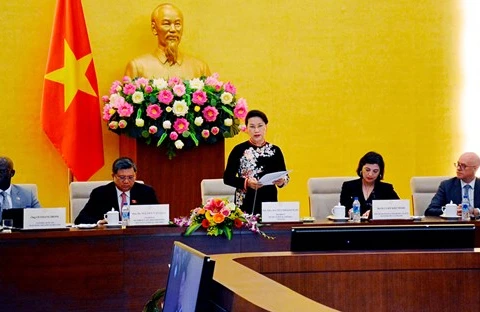Hanoi (VNA) – The International Monetary Fund (IMF) projected Vietnam’s economy to grow by 6.6 percent this year and 6.5 percent the following year in a recent report.
The IMF released a report namely “World Economic Outlook, April 2018” in which it forecast the GDP growth of emerging Southeast Asian economies like Indonesia, Malaysia, the Philippines, Thailand and Vietnam will remain above 5 percent in 2018 and 2019.
Last year, despite many difficulties, Vietnam’s GDP expanded by 6.81 percent, higher than the target set by the National Assembly and the highest over the last decade.
In addition, the quality of Vietnam’s economic growth has also improved with the overall labour productivity gaining about 6 percent in 2017.
Vietnam also saw progress in pursuing a new growth model based on productivity and innovation. The country has gradually reduced its reliance on natural resources, particularly crude oil and shifted their focus to industry, manufacturing, processing and services.
The Government of Vietnam aims for an economic growth of 6.7 percent and an average inflation rate of 4 percent this year.
The IMF also predicted the Asian economy will grow at a rate of around 6.5 percent from 2018-2019 and remain as the engine of the global economy.
According to the fund, Chinese and Indian economies will increase by 6.6 percent and 7.4 percent, respectively, in 2018 while those figures of 2019 will be 6.4 percent and 7.8 percent, respectively.
Most economic forecasts since early April said Vietnam’s GDP growth will be 6.5 percent or higher this year.
On an annual credit analysis released on April 3, Moody’s Investors Service said that Vietnam’s real GDP growth will remain robust, averaging 6.7 percent in 2018.
It said Vietnam’s 2018 growth will be supported by domestic consumption and strong investment growth on the back of public sector infrastructure development spending.
Moody's also expects that strong foreign direct investment (FDI) inflows will continue to diversify Vietnam's economy and strengthen growth compared with similarly rated peers, thereby supporting a stabilization in the government's debt burden.
Meanwhile, the World Bank (WB) on April 12 forecast Vietnam’s economic growth to stabilise around 6.5 percent in 2018 while inflation is predicted to remain moderate thanks to a benign global price environment and strong wage growth may ultimately lift core inflation. External balances are projected to benefit from robust exports and FDI inflows.-VNA
The IMF released a report namely “World Economic Outlook, April 2018” in which it forecast the GDP growth of emerging Southeast Asian economies like Indonesia, Malaysia, the Philippines, Thailand and Vietnam will remain above 5 percent in 2018 and 2019.
Last year, despite many difficulties, Vietnam’s GDP expanded by 6.81 percent, higher than the target set by the National Assembly and the highest over the last decade.
In addition, the quality of Vietnam’s economic growth has also improved with the overall labour productivity gaining about 6 percent in 2017.
Vietnam also saw progress in pursuing a new growth model based on productivity and innovation. The country has gradually reduced its reliance on natural resources, particularly crude oil and shifted their focus to industry, manufacturing, processing and services.
The Government of Vietnam aims for an economic growth of 6.7 percent and an average inflation rate of 4 percent this year.
The IMF also predicted the Asian economy will grow at a rate of around 6.5 percent from 2018-2019 and remain as the engine of the global economy.
According to the fund, Chinese and Indian economies will increase by 6.6 percent and 7.4 percent, respectively, in 2018 while those figures of 2019 will be 6.4 percent and 7.8 percent, respectively.
Most economic forecasts since early April said Vietnam’s GDP growth will be 6.5 percent or higher this year.
On an annual credit analysis released on April 3, Moody’s Investors Service said that Vietnam’s real GDP growth will remain robust, averaging 6.7 percent in 2018.
It said Vietnam’s 2018 growth will be supported by domestic consumption and strong investment growth on the back of public sector infrastructure development spending.
Moody's also expects that strong foreign direct investment (FDI) inflows will continue to diversify Vietnam's economy and strengthen growth compared with similarly rated peers, thereby supporting a stabilization in the government's debt burden.
Meanwhile, the World Bank (WB) on April 12 forecast Vietnam’s economic growth to stabilise around 6.5 percent in 2018 while inflation is predicted to remain moderate thanks to a benign global price environment and strong wage growth may ultimately lift core inflation. External balances are projected to benefit from robust exports and FDI inflows.-VNA
VNA
























